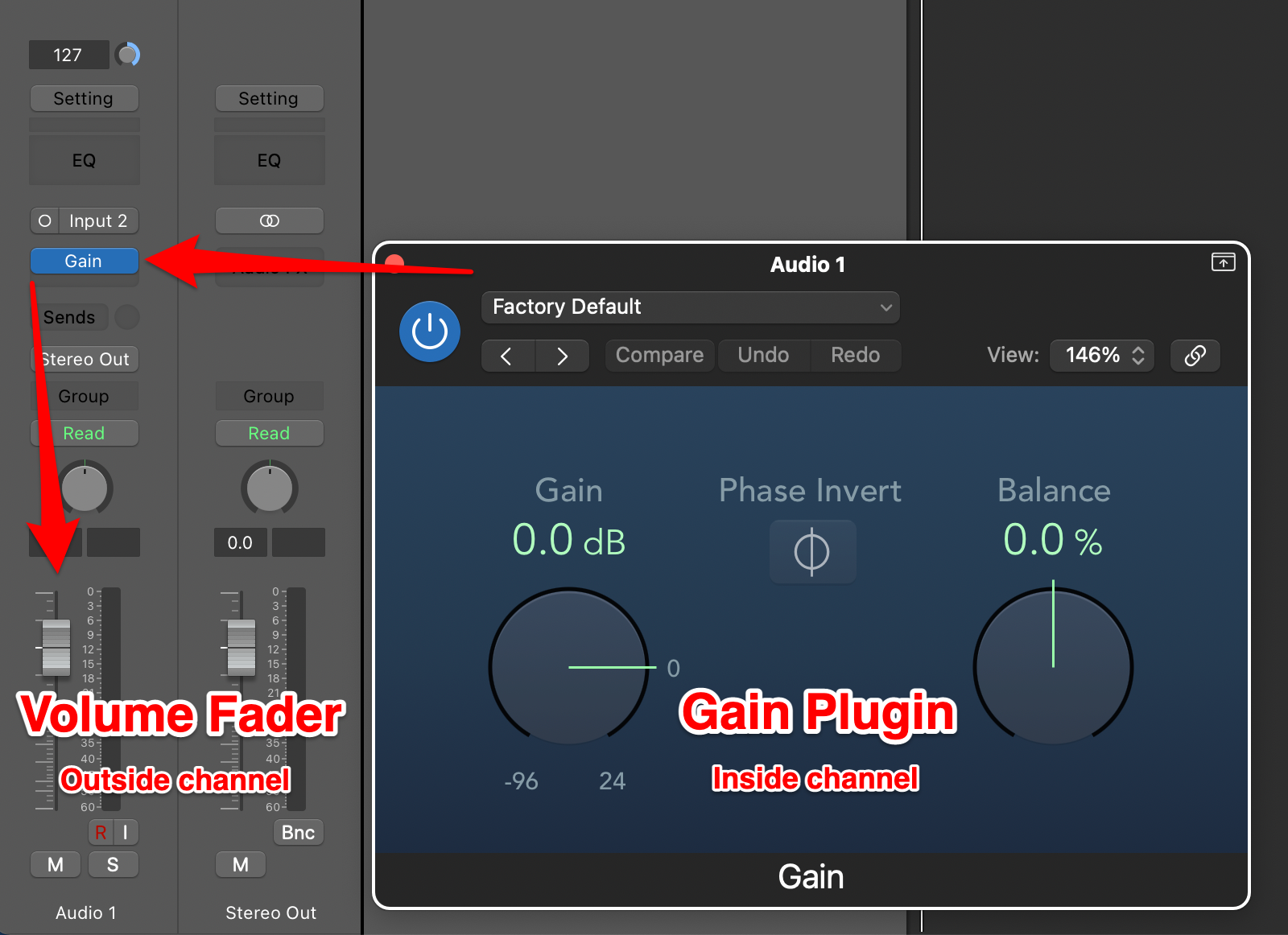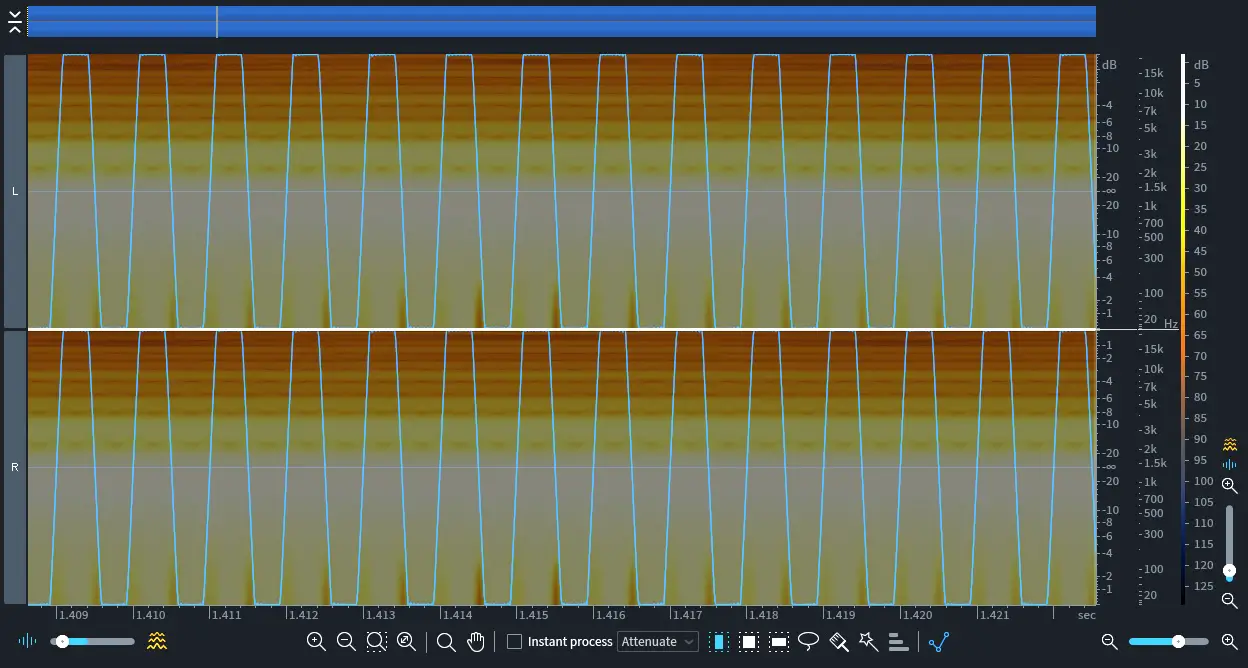If you've been recording or mixing for any length of time, you've undoubtedly run across the term "gain", but what exactly is "gain"?
Isn't is just the same thing as volume, but audio engineers just want to feel snobbish so they created the weird word "gain"?
Not quite.
While in our digital age gain can often be interchanged with volume, there actually is a real difference between gain and volume which matters for audio production quality.
So, what is the difference between gain and volume?
Volume is the decibel (dB) output of a sound system, whereas Gain is decibel input of a system. How loud something is AFTER processing (volume) doesn't change the tone of the sound; however, how loud something is BEFORE (gain) processing definitely will impact the tone.
Okay, that definition is all well and good, but it doesn't really help us know what to do when it comes to mixing with gain and volume.
Keep reading to learn how to use gain (and specifically gain staging) to improve your audio quality and mixes.
Create Pro-Mixes, Faster
Click below to download my free song-finishing checklist to help you create radio-ready songs without taking months to complete them.
What Is Volume?
Volume is a measure of the output of an audio system measured in decibels (dB), or how loud something is after processing.
You can think of an "audio system" as your studio monitors or headphones. So a "system" in this example is really anything that produces sound.
You can adjust the volume of a sound system and it won't impact the quality or tone of the audio signal. It's merely making louder something that is already there.
This is because volume happens at the output, making it incapable of affecting audio quality.
You turn up the volume on your TV or car speakers, and the sound gets louder.
Inside your DAW, you push up the fader on a track and it gets louder.
So that's volume, so what in the world is "gain"?
What Is Gain?
Technically, gain is the ratio between the volume at the input and the volume at the output of an electrical circuit, but this definition isn't as helpful or practical when it comes to mixing.
Practically speaking, gain can be thought of as:
Gain is the decibel (dB) input of a system, or how loud something is before processing.
A microphone preamp’s gain or “trim” control, for example, turns up the input signal of the microphone to a recordable level.
Sometimes gain and volume are used interchangeably, and this is where some confusion occurs.
On a compressor plugin, for example, the “makeup gain” function is really just an output volume knob by another name.
With this in mind, why is gain important? Why do we need to be able to control the volume at the input?
What Is The Difference Between Gain And Volume?
Gain acts like an amplitude knob at the input of a piece of software or hardware that controls the loudness before an audio signal goes through the circuitry. Volume is an amplitude knob that controls the loudness after it has passed through the electronics and processing.

You probably already understand what a volume knob is, and how to use it. Volume doesn't impact sound quality, just the loudness of the system.
However, the gain DOES impact the quality and tone of a sound.
Where gain really comes into play is in the area of mixing known as "gain staging".
What Is Gain Staging?
Gain staging is the process of ensuring that audio is set to an optimal level for the next processor in a processing chain in order to reduce noise and distortion and produce the highest quality audio possible.
The gain is considered "optimal" when it is loud enough to drown out the noise floor of a recording, but not too loud as to cause immediate distortion upon hitting the next processor in a chain.
This is because in a given audio system, there is a maximum loudness available before that system starts to experience distortion.
For example, if you are recording vocals into your DAW and the gain is too loud, you'll experience clipping, and some of your vocal performance will be cut off and lost.

Example of digital clipping showing how the waveform has been squared off.
In the analog world, you would also get distortion when the gain surpassed what a system (such as a mixing console) could handle; however, analog distortion is more rounded, and is generally considered to be pleasing, where as digital distortion is off-putting.
Audio hardware, and the software plugins that emulate them, are designed to operate optimally when they receive a certain level of gain.
If that gain level is too high or low, then your hardware unit or software plugin won't perform at its best, and the audio quality will suffer.
For most plugins, they are calibrated to have a "sweet spot" of "0 VU", or -18 dBFS.
If your gain goes above -18 dBFS, your signal will begin to sound saturated. Far above -18 dBFS, and it will just sound bad.
So be sure to to set the gain for each of your tracks around -18 dBFS (it doesn't have to be perfect, but roughly hitting this mark).
Doing so will ensure you get the highest possible audio quality out of your processing.
Conclusion: Gain vs Volume
While gain and volume are similar, they also have some very important distinctions.
Volume does NOT impact sound quality, while gain does.
Be sure to gain stage before you start mixing, and also as you use each subsequent plugin to ensure all of your processing is done at an optimal level.
This will ensure you are achieving the highest quality audio possible.
That said, using gain is just one piece of the puzzle when it comes to producing pro, radio-worthy tracks.
Create Pro-Mixes, Faster
Click below to download my free song-finishing checklist to help you create radio-ready songs without taking months to complete them.
This checklist will walk you through a proven step-by-step mixing and mastering process so that you don't ever have to guess or wonder what to do next.
You'll know exactly what to do, and when, so you can quickly mix, master, and finish more tracks.
I hope you found this post valuable on gain vs volume.
If so, feel free to share, and let me know in the comments below…
